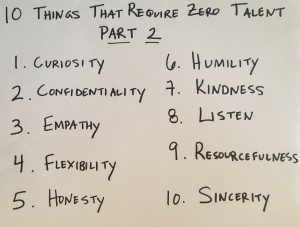Molly Fletcher's Blog, page 10
December 11, 2017
7 Surprising Traits of Elite Leaders
position: relative;
padding-bottom: 56.25%; /* 16:9 */
padding-top: 25px;
height: 0;
}
.videoWrapper iframe {
position: absolute;
top: 0;
left: 0;
width: 100%;
height: 100%;
}
 This is one of the best times of the year for sports. The college football playoffs are set, NFL teams are trying to remain in the hunt for a spot in the Super Bowl, and the NBA and college basketball are underway. The great teams are separating themselves from the pack and are hoping to etch their names in the record books.
This is one of the best times of the year for sports. The college football playoffs are set, NFL teams are trying to remain in the hunt for a spot in the Super Bowl, and the NBA and college basketball are underway. The great teams are separating themselves from the pack and are hoping to etch their names in the record books.
Twelve years ago, Sam Walker, Wall Street Journal deputy editor, set out to answer the question: “What makes great teams great?” What started as a 900-word column for the Journal turned into a decade of research and his new book, The Captain Class: The Hidden Force That Creates the World’s Greatest Teams.
Sam’s answer to “What makes great teams great?” surprised everyone, including himself. He found that the secret to winning isn’t talent, coaching, strategy, or money. It is the presence of a singular leader—those who make up “the captain class.”
In my recent podcast episode, Sam highlighted numerous examples of these leaders who led their team to greatness. Typically they were not the charismatic superstars you would expect. Instead, they all shared seven unique traits. My conversation with Sam forced me to challenge some of my own assumptions. What if the way we are thinking about leadership is all wrong? Are there lessons in Sam’s research that we can apply in our own worlds as business leaders?
Here are the 7 traits and how you can spot them at work:
Extreme doggedness and focus in competition. Who in your office is the most focused? Who always wants to go the extra mile and stay late to perfect the new business pitch?
Aggressive play that tests the limits of the rules. Leaders push boundaries – but only if it benefits the entire team. If someone is bending the rules, determine the reasoning. Is it selfish rebellion or a challenge to move the team forward?
A willingness to do thankless jobs in the shadows. Servant leadership is quiet and selfless. Who cleans up after the office lunch after everyone goes back to their desks? The leaders in Captain Class embraced the dirty work that they’d never get credit for.
A low-key, practical and democratic communiation style. Leaders don’t necessarily have the loudest voice in the meeting. Often they don’t speak much. But when they do, it’s profound and persuasive because they have a pulse on the team.
Motivates others with passionate nonverbal displays. In the book, Sam references athletes who play through pain. This isn’t as common in the office, but think of the teammate who leaves notes for colleauges to motivate them or brings in lunch when the team is working in high gear. These nonverbal efforts speak volumes.
Strong convictions and the courage to stand apart. If you see someone standing firm in his or her belief, even if it’s against the norm, this is a leader worth watching.
Ironclad emotional control. When people are able to focus to get the task done despite difficult circumstances, personal or professional, these are leaders of conviction. Who remains emotionally resilient in the face of adversity and challenges?
Game Changers Podcast – 7 Characteristics of Great Leaders
Sam Walker, deputy editor of The Wall Street Journal, researched what makes great teams great for more than a decade. What he found resulted in his book The Captain Class: The Hidden Force That Creates the World’s Greatest Teams. He found that the secret to winning isn’t talent, coaching, strategy, or money. It is the presence of a singular leader—those who make up Walker’s captain class. Take a listen below to hear his story or visit the Game Changers Podcast page for more in-depth interviews with successful business leaders and athletes.
Your Game Changer Takeaway
Leaders aren’t the charismatic superstars you might expect. Look around your office or team and see if there’s someone you might be overlooking. The captain of the team or office is just as important as the coach or the CEO. Together they can create winning teams and companies that stand the test of time. Have you been looking for leadership in all the wrong places? Here’s a chance to reevaluate your assumptions.
The Molly Fletcher Company inspires leaders, teams and organizations to kick-start growth. A keynote speaker and author , Molly draws on her decades of experiences working with elite athletes and coaches as a sports agent, and applies them to the business world. Her new book, Fearless At Work , is now available. Sign up here to receive our monthly newsletter and subscribe to the Game Changers with Molly Fletcher podcast on iTunes.
The post 7 Surprising Traits of Elite Leaders appeared first on Molly Fletcher.
December 4, 2017
Your Willpower Needs A Why
 “Why do you get up in the morning? Why does your organization exist? Your Why is the purpose, cause or belief that inspires you to do what you do. When you think, act and communicate starting with Why, you can inspire others.” – Simon Sinek
“Why do you get up in the morning? Why does your organization exist? Your Why is the purpose, cause or belief that inspires you to do what you do. When you think, act and communicate starting with Why, you can inspire others.” – Simon Sinek
Simon Sinek is masterful at explaining that “Your Why” is fundamental in leadership. Recently in a conversation with a good friend of mine, who was sharing her struggles with having will power during this holiday season, it also became so clear to me that having a Why is at the crux of exercising willpower, too.
What’s the point?
Willpower is anchored in a reason or a purpose, and it is easier to deploy when you know why you’re doing it. As you look at the areas in life where you want to increase willpower, do as Simon Sinek suggests and Start With Why. Once you know why you want to lose weight, increase your sales numbers, or start a business, it can help you visualize and achieve the desired result.
Blake Mycoskie, the Founder and Chief Shoe Giver of TOMS, didn’t start his shoe business to make millions. While traveling in Argentina in 2006, Blake witnessed the hardships faced by children growing up without shoes. He created a solution – the one for one model – that guaranteed a constant flow of shoes. For every purchase of a pair of shoes today, another pair would be donated to someone in need tomorrow. As he started his quest to build this business, several people called him “loco,” but he exerted his willpower and persevered because his mission was clear.
Not everyone’s why will be as altruistic as Blake’s, but it exemplifies that if you truly know your why, it can be a lot easier to make things happen.
How will you feel afterwards?
One way to power through moments when you feel your willpower waning is to ask a simple question: “How am I going to feel afterwards?” Just sit in that question for a full minute. How will you feel if you postpone that meeting with your boss or skip a practice or crush the late night brownies?
When Kobe Bryant was 12, he decided he wanted to give up on basketball after showing little promise in the sport. But when he read about how Michael Jordan had gotten cut from his basketball team once and was able to use that failure as motivation, Kobe decided to follow suit. He chose to outwork everyone around him, which meant no matter how bored or how tired of practice he became, he’d never quit. He knew if he skipped a practice, he would feel terrible. This brings to mind infamous basketball coach Bobby Knight’s saying: “The will to win is not nearly as important as the will to prepare to win.” Kobe always knew the answer to “how will you feel if you skip practice?” So much so that, thanks to his tremendous willpower, he has practically assured himself a spot in the NBA Hall-of-Fame.
Thinking of this from a work perspective, if you keep delaying a meeting with your boss in which you have to deliver bad news, you might feel a bit of instant relief, but the meeting will still need to happen and there will be an underlying feeling of dread. If you take time to think through how you will feel after the meeting is over, you will get a glimpse of the tremendous satisfaction you would feel. As Gretchen Rubin, author of “The Happiness Project” says, “Procrastinating just makes it harder; getting difficult calls or emails done as quickly as possible gives a big boost of relieved energy.”
Your Game Changer Takeaway
Exercising willpower can be a lot easier said than done. But finding the why behind it and pausing to think about how you might feel afterwards might help you get over the hump. As you encounter situations where you need to flex your willpower muscle, use these two strategies to outsmart temptations.
The Molly Fletcher Company inspires leaders, teams and organizations to kick-start growth. A keynote speaker and author , Molly draws on her decades of experiences working with elite athletes and coaches as a sports agent, and applies them to the business world. Her new book, Fearless At Work , is now available. Sign up here to receive our monthly newsletter and subscribe to the Game Changers with Molly Fletcher podcast on iTunes.
The post Your Willpower Needs A Why appeared first on Molly Fletcher.
November 27, 2017
10 Things That Require Zero Talent Part 2
 One of our highest ranking blogs is 10 Things That Require Zero Talent. It’s been about a year since that blog, and I’d like to add 10 more behaviors that we can control that require zero talent yet have a huge impact on our success.
One of our highest ranking blogs is 10 Things That Require Zero Talent. It’s been about a year since that blog, and I’d like to add 10 more behaviors that we can control that require zero talent yet have a huge impact on our success.
Curiosity – Curiosity is the key to discovering new habits, new likes (or dislikes) and new information. Whether it’s an innate or a learned trait, when you are curious, you are mentally engaged, which will help you be a lifelong learner.
Confidentiality – Being trusted with private information is important at work and at home. When someone entrusts you with information that is sensitive, keep your word.. Billie Jean King has said as a tennis player you are only as good as your second serve; in life, I believe you are only as good as your word.
Empathy – When you can put yourself in someone else’s shoes and understand what they are going through, you really connect with that person. Empathy lets you forgive faster and connect sooner.
Flexibility – Having a routine and schedule is great for discipline. But when you’re unable (or unhappy) to change your routine that can cause problems. You want to plan and execute, but you should always be ready to jump to plan B if the situation calls for flexibility.
Honesty – This really needs no explanation. Plus I have always loved this Mark Twain quote: “If you tell the truth, you don’t have to rememberanything.”
Humility – When you check your ego at the door, you open up a world of possibilities. Just because you are in charge, no one person ever has the answers. The best leaders are humble leaders.
Kindness – If you’ve ever been to a Chick-fil-A, you know why they are successful. All of their associates are pleasant and kind. They have proved that kindness can be a successful differentiator.
Listen – Most of us are good at talking but not enough of us are good at listening. This easy skill can help us better understand people and it shows people they are important to us when we let them speak.
Resourcefulness – Resourcefulness is one of my favorite words. It’s important to never ask a question that you could have answered yourself.
Sincerity – It’s simple: say what you mean. We all have people in our lives who say “let’s have lunch” but don’t intend to do it. Be the person who is sincere, and always mean what you say.
Your Game Changer Takeaway
The saying “Don’t rest on your laurels” is from Ancient Greece but it still holds true today. So don’t just rely on your natural abilities; work hard to develop these 10 traits and watch how rewarding these attainable characteristics can be.
The Molly Fletcher Company inspires leaders, teams and organizations to kick-start growth. A keynote speaker and author , Molly draws on her decades of experiences working with elite athletes and coaches as a sports agent, and applies them to the business world. Her new book, Fearless At Work , is now available. Sign up here to receive our monthly newsletter and subscribe to the Game Changers with Molly Fletcher podcast on iTunes.
The post 10 Things That Require Zero Talent Part 2 appeared first on Molly Fletcher.
November 20, 2017
Don’t Just Be Thankful this Thanksgiving
 Like many people, Thanksgiving is one of my favorite holidays. The best part to me is that as a country, we all pause and take time to reflect on our lives and give thanks. We come together to help those in need. But after reading Sheryl Sandberg’s new book Option B: Facing Adversity, Building Resilience, and Finding Joy, I have a slight addition to the gratitude practice I recommended in the blog I wrote last Thanksgiving.
Like many people, Thanksgiving is one of my favorite holidays. The best part to me is that as a country, we all pause and take time to reflect on our lives and give thanks. We come together to help those in need. But after reading Sheryl Sandberg’s new book Option B: Facing Adversity, Building Resilience, and Finding Joy, I have a slight addition to the gratitude practice I recommended in the blog I wrote last Thanksgiving.
Re-thinking the gratitude list
Many people have the habit of writing a gratitude list so they can be conscious of the good things in their life. And last year at Thanksgiving, I encouraged people to make intentional gratitude part of every single day; I still believe that holds a lot of power and practice it daily. After reading Option B, however, I have a new perspective on the gratitude list.
In Sheryl Sandberg’s book, she describes that after the sudden death of her husband, she felt certain that she and her children would never feel pure joy again. Her friend Adam Grant, a psychologist at Wharton, told her there are concrete steps people can take to recover and rebound from life-shattering experiences. She explains how author Adam Grant challenged her to keep a contributions list.
In his opinion, a gratitude list is passive, but a contributions list is active. It recognizes progress and reminds you to make a difference. In the book Sheryl explains that at first it was hard for her to write down three things that she did well each day. At the beginning it was just “I got dressed today.” But as she got more used to it, it really helped boost her effort throughout the day.
I love this shift in thinking. Yes, we should count our blessings. But what if in addition to writing what we are grateful for, we acknowledge how we made an impact in the world around us. By exploring our outward impact, we are less introspective. And this might help reconnect you with your purpose, which is what truly guides us towards fulfillment.
At work
Thinking about this concept in a business setting makes perfect sense. If you are the top sales person you can’t just sit back and be thankful for the fact you’re crushing your numbers. You have to continue to contribute to your success to make an impact. And the converse is also true – if you’re a sales manager and someone on your team has potential but has yet to find success, encourage her to start his list of contributions to the team. Maybe they are only internal activities – “I brought bagels to the office today!” or “I was a great sounding board for John as he prepped for a sales call” – but more than likely they will boost confidence, which could increase results.
At home
As a mom, I love to try to weave this mindset into my conversation with our daughters. The other day my daughter lost her basketball game and came home disappointed in the result. Later in the day, when I could tell she was still a bit bummed about the game, I tried to have her tell me all the great things in her life. “I know you are bummed about the game, but what is awesome in your world?” I added in this question as well….”what are a few ways you positively impacted the team today?” I believe these kinds of conversations help shift mindset and help us recover and re-focus more quickly.
Your Game Changer Takeaway
Both a gratitude list and a contribution list have their merits. At different times in your life you might need one more than the other. Regardless of whether you’re a business leader, a parent, a coach or even all of the above, start adding your contributions to your daily journal to see how you can change your thinking. My hope is that this Thanksgiving, you count your blessings and your contributions to make this holiday even more meaningful.
The Molly Fletcher Company inspires leaders, teams and organizations to kick-start growth. A keynote speaker and author , Molly draws on her decades of experiences working with elite athletes and coaches as a sports agent, and applies them to the business world. Her new book, Fearless At Work , is now available. Sign up here to receive our monthly newsletter and subscribe to the Game Changers with Molly Fletcher podcast on iTunes.
The post Don’t Just Be Thankful this Thanksgiving appeared first on Molly Fletcher.
November 13, 2017
Is Technology Helping or Hurting You?
 The Apple iPhone X was released earlier this month, and it is awesome. A new all-screen design; Face ID, which makes your face your password; and the smartest chip ever in a smartphone. It’s hard to believe how much technology has changed since the first iPhone was announced ten years ago. It’s also hard to believe how much technology has changed us in ten years.
The Apple iPhone X was released earlier this month, and it is awesome. A new all-screen design; Face ID, which makes your face your password; and the smartest chip ever in a smartphone. It’s hard to believe how much technology has changed since the first iPhone was announced ten years ago. It’s also hard to believe how much technology has changed us in ten years.
Most of us can’t imagine leaving the house without our smartphone, even if it’s a simple trip to the grocery store. We now have to monitor our kids to make sure they’re not getting too much screen time – including my own teenage daughters! And now we can conduct business faster and more efficiently from almost any location.
But sometimes we can misuse technology. So here are a few questions to consider to make sure you’re using technology to help you, not hurt you.
Can you walk to the person you’re about to email or call? If the answer is yes, then get out of your seat. Of course sometimes a quick email or call can help speedily answer a yes or no question, but if your email is lengthy and in-depth, a face-to-face conversation will allow you to explain the nuances that an email can’t.
Is it helping your connection with someone? If you’re trying to impress someone, would you take them to a ballgame and sit on the front row together to enjoy a mutual experience, or would you text them and tell them what channel the game is on? As ridiculous as that sounds, that’s the difference between communicating and connecting in person, and sending an email or text. If you have the opportunity to deepen your connection in-person, seize the moment.
Would you say the same thing under your name or only anonymously? Recently Kevin Durant’s tweets under a ghost account blasted both his ex-coach and teammates. Now with the Golden State Warriors, Durant was formerly with the Oklahoma Thunder and he has always used Twitter to engage with fans. Under his ghost account, however, he was much more brutal and honest about moving teams. Later he apologized for “taking it too far” with his comments, but this is a perfect example of using social media as a shield. Ultimately, it’s just like mom said, if you’re not going to say anything nice, don’t say anything.
WWSJD? (What would Steve Jobs do?) Though he is responsible for so much of the technology we enjoy today, Steve Jobs went to great lengths to explain why he believes face-to-face communication is so powerful. He said, “Creativity comes through spontaneous meetings and random discussions. You can’t get that over email or iChat.” When Jobs was at Pixar, he created the office so people had to walk by each other and they had to see each other. He believes that was one of the cornerstones of his success. Ask yourself, WWSJD do: call, text, email, or meet in person? If the guy who invented the iPhone would opt for face-to-face communciation, you should consider that option, too.
Your Game Changer Takeaway
93% of communication isn’t what you say, but how you say it. Use your phone or computer to help you work smarter. But remember, when it’s in person or live, your communication will always be more genuine and authentic. Use these four questions to steer you onto a path of deeper connections and better relationships.
The Molly Fletcher Company inspires leaders, teams and organizations to kick-start growth. A keynote speaker and author , Molly draws on her decades of experiences working with elite athletes and coaches as a sports agent, and applies them to the business world. Her new book, Fearless At Work , is now available. Sign up here to receive our monthly newsletter and subscribe to the Game Changers with Molly Fletcher podcast on iTunes.
The post Is Technology Helping or Hurting You? appeared first on Molly Fletcher.
November 6, 2017
Are You Asking the Right Questions?
 “I have no special talent. I am just passionately curious.” Albert Einstein
“I have no special talent. I am just passionately curious.” Albert Einstein
In my blog last week, I wrote about the importance of asking questions and staying curious. But it’s not just about asking any question; asking the right question is what’s most important. It’s quality, not quantity, that counts. Here are some ways to construct and deliver the best questions to get the answers you need.
Do your homework. Before asking your client, boss, coach or recruit a question, do your research to see if you can find the answer yourself. Resourcefulness is one of my favorite words and it is a trait that isn’t used enough today. Even with my daughters – when they ask, “Mom, what do we have to eat?” I simply respond, “Check out the pantry or fridge!” They can research themselves. I remind them, it’s important to never ask a question that you could have answered yourself.
Rehearse. Role-playing is a great way to practice asking questions, anticipating answers and actively listening. When you’re actively listening, you demonstrate an intent for understanding and show your interest in others.
Deliver it the right way. Determine how you should ask the question – by phone, email, or in person? A sensitive or caring tone generally creates the greatest impact when asking questions. Make sure you’re authentic in your tone and use the best vehicle to ask the question.
Observe. After you ask the question, what happens? Did your question elicit excitement or frustration? If you’re asking questions to a client or recruit, these emotions can signal you to an area where they may need your help. By paying attention to tone, length of response and whether they respond quickly or take time to think about the question, it will help you craft follow-up questions if needed. Listen with your eyes (if in person), not just your ears.
Learn from the press. Watch any press conference after a football game and you’ll learn a great tip about asking questions from reporters: stop talking. The media are so good at asking open-ended questions and then being quiet. They let the athlete or coach talk. And talk. And talk. And sometimes they talk themselves into a hole. But these open-ended questions are a great way to let someone fully answer and provide information you otherwise wouldn’t get if you continued to talk.
Your Game Changer Takeaway
Ultimately, when asking questions, just remember IBM’s iconic slogan: “THINK.” When Thomas Watson, who led IBM from 1914 to 1956, first used the slogan in 1911, he said “The trouble with every one of us is that we don’t think enough.” Asked later what he meant by the slogan, Watson replied, “By THINK I mean take everything into consideration.”
As you prepare for meetings with your team, don’t forget to THINK. Take a few minutes ahead of time to come up with some questions you’d like to ask. Questions can serve as a gateway to authentic relationships, and our relationships are what drive our business success.
The Molly Fletcher Company inspires leaders, teams and organizations to kick-start growth. A keynote speaker and author , Molly draws on her decades of experiences working with elite athletes and coaches as a sports agent, and applies them to the business world. Her new book, Fearless At Work , is now available. Sign up here to receive our monthly newsletter and subscribe to the Game Changers with Molly Fletcher podcast on iTunes.
The post Are You Asking the Right Questions? appeared first on Molly Fletcher.
October 30, 2017
Top 4 Reasons to Ask Questions and Stay Curious
 As a sports agent, a big part of my job was recruiting new talent. One time an agent on my team came into my office, frustrated that he hadn’t been able to connect with a player he was recruiting. He was calling him, going to his games, reaching out, but he just couldn’t lock in on the kid. After a few minutes listening, I asked my agent, “Have you asked him who’s making the decision?” My agent paused and looked around sheepishly— “No,” he said. “I can’t believe I didn’t ask that question.”
As a sports agent, a big part of my job was recruiting new talent. One time an agent on my team came into my office, frustrated that he hadn’t been able to connect with a player he was recruiting. He was calling him, going to his games, reaching out, but he just couldn’t lock in on the kid. After a few minutes listening, I asked my agent, “Have you asked him who’s making the decision?” My agent paused and looked around sheepishly— “No,” he said. “I can’t believe I didn’t ask that question.”
A few days later he did ask the question, and found out that the player’s parents were really the decision makers. The athlete wasn’t worried about his future agent, he just wanted to play baseball and focus on his game. Fortunately my agent was able to connect with his parents and quickly get traction, and we were lucky to represent him for several years.
I love this story because it demonstrates how crucial it is to ask questions. It can be the difference between getting the deal and not getting the deal. I always end my Game Changers podcast with “Be bold and stay curious” because asking great questions and staying curious is a game changer in business. Here are 4 reasons why:
Discover what really matters. Asking questions is a tool to learn what really matters to someone and find out what’s important to them. And when you have this information, it helps you connect. You can empathize with them and find out what’s keeping them up at night. With that information and connection, you can figure out how your service or product can help solve their problem.
Demonstrate your knowledge. Asking questions allows you to prove you know your stuff! As a female sports agent, I always had to assert my credibility early. A quick question about the game the night before using baseball lingo was an easy way to subtly demonstrate I understood their world. By asking questions you demonstrate what you know and you deepen the connection. This translates so well to business – if you’re pitching a restaurant client, grab the latest copy of Nation’s Restaurant News so you’re up speed on the industry; if you’re pitching a financial institution, read The Wall Street Journal regularly. It doesn’t take long to step in to their world and then use that knowledge to help deepen your relationship.
Fix problems before they get bigger. Have you ever left a meeting and thought, “Man, I’m glad that question didn’t come up!” Well guess what? That was the one question you should have asked. We all know that eventually, that question – and underlying problem – will resurface, and it is always easier to face it earlier rather than later. Mark Twain’s quote sums it up perfectly: “ If it’s your job to eat a frog, it’s best to do it first thing in the morning, and if it’s your job to eat two frogs, it’s best to eat the biggest one first.” Don’t procrastinate; have the courage to speak up and ask the tough question. It shows confidence and allows you to solve the problem before it gets bigger.
Develop a growth mindset. In Carol Dweck’s book Mindset , she examines the difference between a fixed mindset and a growth mindset. In a fixed mindset, people believe their basic qualities, like their intelligence or talent, are simply fixed traits. In a growth mindset, people believe that their most basic abilities can be developed through dedication and hard work. When you’re curious, you’re embracing a growth mindset, and this creates a love of learning and a resilience that is essential.
Your Game Changer Takeaway
The right questions allow you to gather valuable data that creates the foundation for successful relationships. A question is a simple action, but it is also a powerful way to learn about others’ priorities and needs.
I encourage you to ask questions in all aspects of your life. You’ll be amazed at how powerful it is to be curious.
The Molly Fletcher Company inspires leaders, teams and organizations to kick-start growth. A keynote speaker and author , Molly draws on her decades of experiences working with elite athletes and coaches as a sports agent, and applies them to the business world. Her new book, Fearless At Work , is now available. Sign up here to receive our monthly newsletter and subscribe to the Game Changers with Molly Fletcher podcast on iTunes.
The post Top 4 Reasons to Ask Questions and Stay Curious appeared first on Molly Fletcher.
October 23, 2017
Big Ego Survival Guide
 Merriam-Webster defines ego as “the self especially as contrasted with another self or the world.” But in our world of selfies, the humblebrag and YouTube stardom (I don’t think that’s a thing, but my daughters do), the definition of ego in today’s vernacular is something more along the lines of “a person who is a legend in his or her own mind.”
Merriam-Webster defines ego as “the self especially as contrasted with another self or the world.” But in our world of selfies, the humblebrag and YouTube stardom (I don’t think that’s a thing, but my daughters do), the definition of ego in today’s vernacular is something more along the lines of “a person who is a legend in his or her own mind.”
We all deal with people with big egos: a colleague, a neighbor, a boss, or even an acquaintance at the gym. Working with athletes, I came across more than my share of big egos. In some ways, athletes have to be selfish. In my recent podcast conversation with University of Connecticut’s head women’s basketball coach Geno Auriemma, he admits that if you’re not a little bit selfish, you’ll never be great, but goes on to explain that it must be within the context of what’s best for the team.
Regardless, for those of us who have to deal with these big egos on a regular basis, here are some small ways to help you manage these large personalities.
Recognize It
A few years ago I was driving around town with one of the athletes I represented, and due to a time crunch, he was in the car with me during preschool pick up. As many people know, in car pool you have your children’s assigned number adhered to your front windshield so the teachers know which kid(s) to put in your car. We were pulling into the school when the athlete noticed the number on my dashboard and remarked, “Wow, Molly, that’s awesome!” For a minute I was stumped. I had to pause to process what he said. And then it clicked – I looked at the number, then looked back at the player (who will remain nameless), and I realized he thought the car pool number was because of him. I thought to myself, “Oh my gosh, this guy thinks I have his jersey number as a sticker on my car!” I knew right then and there this guy was as self absorbed as I thought. I let him know that he was really important to me, but I wasn’t running around with his number on my windshield! It was just a coincidence and that was my kids’ carpool number. This conversation really helped me work with him down the road. I was able to manage my expectations when interacting with him and could also check him with love when needed. Once I had recognized what I was dealing with, our future meetings and interactions were much more manageable.
Let It Go (Unless the Facts Prove Otherwise)
It’s cliché, but it’s true: Let. It. Go. As best you can, let them have the last word. Remind yourself that those with big egos have something to prove, and you don’t. That said, it is also important to have facts on your side. If an egotistical colleague continues to spout off statements you know to be false, definitely speak up. Luckily the smart phone in your pocket can help you find accurate statistics like a boss! It’s especially important to speak up if the person using these erroneous facts is doing harm to his reputation or the company’s. It can be hard to correct someone with an ego, but my rule of thumb is to speak up if it puts him or the company in a negative light. Ultimately, choose to let harmless, unimportant statements slide off your back, but stand firm when it comes to statistics, accuracy and your/your company’s reputation.
Positive Reinforcement
When you see someone with a big ego do something selfless, I highly recommend positively reinforcing that behavior. Compliment them in front of others or send them a private note to say how nice it was they gave someone else the credit. If you can show them to put their personal win second for the sake of a team win, that will go a long way to help tame their egos.
Your Game Changer Takeaway
In a nutshell, be the bigger person. It can be hard to deal with a big ego, but many times you’ll have to in order to complete your project, solve your problem or even finish your workout at the gym. In Ryan Holiday’s book, Ego is the Enemy, he tells us that that the main impediment to a full, successful life is not in the outside world but lies within: our ego. The book reminds us that an ego is a living, breathing thing and we need to keep it in check on a regular basis. I encourage you to be patient with the egos you deal with in your life, while also remaining humble in your own.
The Molly Fletcher Company inspires leaders, teams and organizations to kick-start growth. A keynote speaker and author , Molly draws on her decades of experiences working with elite athletes and coaches as a sports agent, and applies them to the business world. Her new book, Fearless At Work , is now available. Sign up here to receive our monthly newsletter and subscribe to the Game Changers with Molly Fletcher podcast on iTunes.
The post Big Ego Survival Guide appeared first on Molly Fletcher.
October 16, 2017
4 Characteristics of a Toxic Workplace – And How to Avoid Them
 One of my favorite parts of my job is getting inside the heads and hearts of the companies and organizations I visit. Every company has its own unique culture and a lot of leaders I talk to are in the midst of trying to transform their company culture. No one thrives in a toxic workplace… but how do we avoid getting there in the first place? Here are four behaviors that contribute to a toxic workplace—and how you can avoid these common pitfalls.
One of my favorite parts of my job is getting inside the heads and hearts of the companies and organizations I visit. Every company has its own unique culture and a lot of leaders I talk to are in the midst of trying to transform their company culture. No one thrives in a toxic workplace… but how do we avoid getting there in the first place? Here are four behaviors that contribute to a toxic workplace—and how you can avoid these common pitfalls.
Not celebrating success. A friend of mine had a boss who simply never got excited about anything. Whether she won a big client, closed a big deal, or exceeded sales goals, there was never a celebration. Her boss was too afraid that the team would immediately think the huge new deal would mean more money for the company, ergo the employees would want more money and ask for a raise. The boss was so focused on the bottom line, he didn’t see the morale buzzkill he was causing. Celebrate the wins- big and small.
No trust. A lack of trust in the workplace is extremely toxic. If the boss doesn’t trust the team to get the job done, most likely the job will never get done. If employees aren’t trusted to fulfill their roles, they’ll start losing confidence and productivity will decrease. Managers need to trust they have the right person in the right role (if not, maybe it’s time for a tough conversation). A true leader cannot be involved in every company decision; they hire the right people and let them make decisions so their time can be used effectively elsewhere. If they fail, they can learn and grow from their own mistakes. To avoid a lack of trust in the workplace, become a better communicator. If you’re having trouble with an employee’s work – tell them. Don’t do it for them. This will quickly spiral downward into an environment where there is zero trust.
Afraid of change. Have you ever heard the adage “The seven most expensive words in business are ‘We have always done it that way’”? Most people who respond that way are afraid of change. Yes there are merits to methods that are tried and true, but only if you are constantly looking at what could be done differently and how it could be improved. After all, the only thing constant in life is change. To battle this fear of change, it’s important to own your fears and communicate them with your team or boss. After that, become involved in the change if you can and, most importantly, keep doing your job. As you focus on working and keeping an open line of communication with your team, you’ll better handle changes as they come.
All business all the time. It’s important to keep a level of separation between your professional life and personal life; but at the same time, we spend most of our waking hours with the people we work with, and like it or not, your colleagues will get to know the whole you. If your employee or colleague’s child or parent is sick, ask about it. People want to know that you care about them. Poet Maya Angelou said it best, “People will forget what you said, people will forget what you did, but people will never forget how you made them feel.” When people feel supported and understood, they are more likely to stay engaged and motivated at work.
Your Game Changer Takeaway
Are any of these underlying causes of toxic workplaces creeping into your company culture? Be intentional about making a shift! Celebrate the big successes at the office and also the little ones – it’s great for both morale and employee engagement. Trust your employees to do their jobs and then get out of their way! Embrace change; but if you can’t embrace it, accept it. Most importantly, remember to treat colleagues as the human beings they are. And if these characteristics remind you of your workplace, do what you can to fix it or be ready to make a big change of your own.
The Molly Fletcher Company inspires leaders, teams and organizations to kick-start growth. A keynote speaker and author , Molly draws on her decades of experiences working with elite athletes and coaches as a sports agent, and applies them to the business world. Her new book, Fearless At Work , is now available. Sign up here to receive our monthly newsletter and subscribe to the Game Changers with Molly Fletcher podcast on iTunes.
The post 4 Characteristics of a Toxic Workplace – And How to Avoid Them appeared first on Molly Fletcher.
October 8, 2017
The #1 Reason Sales People Lose the Deal
 What’s the number one reason sales people lose the deal? They are too focused on the deal!
What’s the number one reason sales people lose the deal? They are too focused on the deal!
When you’re in sales, the top priority is ABC – always be closing. If you’re up against a quota, you do what you have to do to close the deal. But that’s where the problem starts – you’re focused on you and not on your clients.
In my career as a sports agent, I negotiated over $500 million in contracts. That highly competitive environment—where there are actually more agents than athletes to represent—taught me the value of relationships over transactions. When you take care of the relationship, it yields a two-way dialogue that benefits you both. If it’s just about signing on the bottom line, it’s one and done.
These three tips will help you focus on relationships, not transactions:
Act like you have the business before you have the business . When I started my career, I was very intentional about connecting with people when I thought of them, not when I needed something from them. I learned that this was essential to relationship building and it often helped me build my roster of clients. When Atlanta Braves player Mark DeRosa was called up to the big leagues, I called to congratulate him. He is a great guy – bright, talented, and a rising star in MLB. Living in Atlanta, I started thinking how he was a real gem for the city and should be positioned as a marquee player in town. A few days later I called him back and offered to set up a few media interviews with reporter connections of mine, which he happily agreed to. He was thrilled with the press coverage and it helped boost his public profile. Mark and I continued to stay in touch organically. And a year or so later when he was looking for a new agent, he signed with us..
Communicate regularly, not annually. Is the only time your client or customer hears from you is when it’s time to renew the deal? That’s a big red flag. Stay curious and find ways to consistently connect—it can be as simple as checking in about a piece of industry news, making a beneficial introduction, or sharing a resource like a podcast or book that can benefit them. Be purposeful about putting yourself in their shoes and consistently adding value.
If you love them, set them free. As a sports agent, we signed contracts with our clients that allowed them to fire us at anytime. It was not the norm in the industry, but it was our way to show our athletes that we were there to serve them. And if we weren’t serving them, they could leave, simple as that. We earned our business every day. We live in a world where people have options. With so many choices, people want to do business with people they like, they trust and that help them. Don’t be afraid to give your clients freedom. It demonstrates confidence in your ability to deliver.
Your Game Changer Takeaway
Closing the deal isn’t a future event; it’s an everyday activity. Stop focusing on selling and focus on solving your customers’ problems. Remember, relationships are reciprocal. Author Donald Miller says, “All relationships are give-and-take and the more you give to your customers, the more likely they will be to give something back in the future. Give freely.”
The Molly Fletcher Company inspires leaders, teams and organizations to kick-start growth. A keynote speaker and author , Molly draws on her decades of experiences working with elite athletes and coaches as a sports agent, and applies them to the business world. Her new book, Fearless At Work , is now available. Sign up here to receive our monthly newsletter and subscribe to the Game Changers with Molly Fletcher podcast on iTunes.
The post The #1 Reason Sales People Lose the Deal appeared first on Molly Fletcher.



